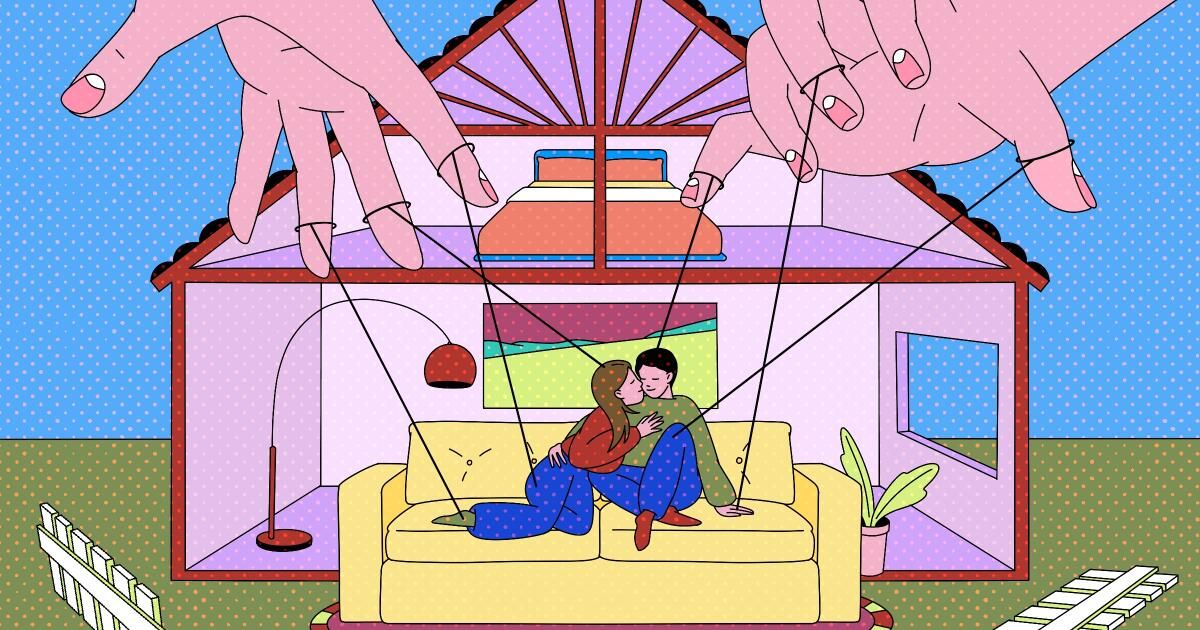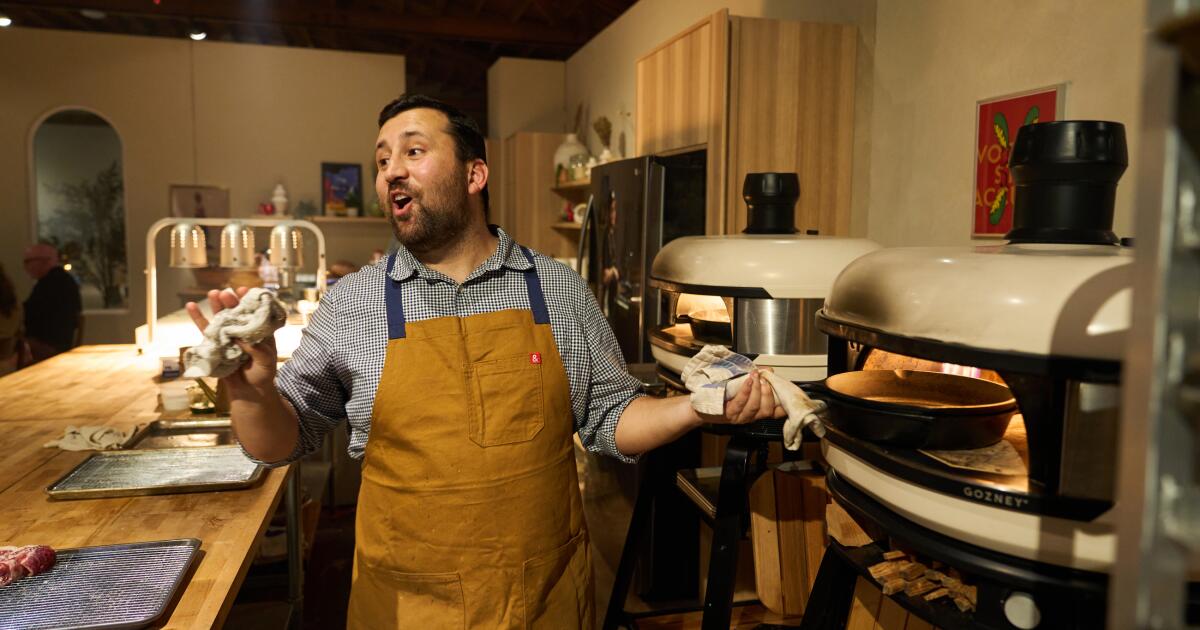When my wife and I appeared on “House Hunters Renovation,” our on-screen lives seemed perfect as our house was being rebuilt. But off-screen, our family was falling apart. Although we transformed the kitchen with imported tiles and a French stove pulled from our shared Pinterest board, viewers had no idea that we were adoptive parents struggling to keep our marriage intact.
We all know that reality shows are not entirely real. It feeds on exaggerations and half-truths. During two months of filming in Atwater Village and Silver Lake, we were portrayed as a carefree, childless couple. We were actually a family of four and began the uncertain process of adopting the young siblings we had raised for almost a year. Two moms and two kids: “Even Stevens,” the kids liked to say.
Although social workers assured us that our family would be permanent, the children could not appear on screen due to privacy rules. After saying goodbye to a baby we welcomed the year before, we didn't even mention it, in case things changed.
On screen, Mary and I enjoyed wine with friends, exercised, and walked our dogs—a narrative built from a highly scheduled day of filming. While we staged home improvement scenes and seemed preoccupied with appliances, real life was much more dramatic than the usual “Where's your closet?” of the program. moments.
The children became increasingly anxious when relatives they had not seen since childhood expressed interest in guardianship. We acted as if we believed the idea was good for them; maybe it was. They had just started calling us their mothers, clinging to us as we facilitated visits to relatives to facilitate a possible transition, not for us, but for them.
Our episode didn't capture scenes of us comforting the oldest when his night terrors returned or taking calls from school on filming days when the youngest begged to come home. We would turn off our microphone packs as we coaxed him back to class, assuring him that we would always be there at the end of the day. I wondered how long we could keep that promise.
In between foster care and renovations, we also deal with the usual parenting duties: karate, playdates, and meltdowns. Hectic work schedules left us little time to discuss anything other than home improvements and the kids' activities. Meanwhile, we tracked each outfit on camera in case the producers needed to “make adjustments” later. We maintained a careful facade for the camera. For us too. I wanted our life to feel as good as it looked.
On weekends off from filming, I brought margaritas in an insulated bottle for family trips to the park, telling myself it was the same as having brunch with friends, something our schedule no longer allowed for. Mary and I passed the bottle back and forth, touching our hands, the only sign of intimacy those days.
As the renovation progressed, we began to argue. We clashed over the smallest things: schedules and meals. Our only time alone was spent drinking wine in front of the TV after reading the children's bedtime stories.
We started couples therapy toward the end of filming “House Hunters,” one more thing to fit into our week. We walked into our first session holding hands, but the vibe changed when we settled on opposite ends of the couch. I went in optimistic, hoping for advice on reconnecting, but Mary said she wanted space; things were too difficult. My heart pounded in my ears as the room blurred around me. I was wondering if we were filming a different reality show. He was probably being “punk.”
The increasing pressures of work, remodeling, filming and parenting, while facing the challenge of the foster care system and the increasingly likely departure of the children, were certainly taking their toll. But more distance seemed like the opposite of what we needed. The boys had no idea anything was wrong. We present a front of stability for your sake. As we moved forward, it became clear: we needed to rehabilitate our communication and lay the foundation for a meaningful connection.
We begin with our actor-turned-therapist's daily check-in task to share thoughts and feelings, not just the day's events. Although awkward at first, these steps built trust and helped us reconnect, not only as co-parents, but also as partners. Slowly, our walls crumbled.
After some delays, our renovation was complete. It should have been a happier time, but we moved while we were preparing the children to go live with their relatives. Although saying goodbye was heartbreaking, we knew it would probably be the best thing for all of us. Not knowing what kind of family we could provide if they stayed, we would always miss them, but I also felt a little relief that we had our lives back. Perhaps now we can refocus and rebuild – a bittersweet transition.
We stopped arguing. We weren't that stressed. We had meaningful conversations, not just logistics briefs. We went on dates, reconnected with friends, and revisited shared and separate interests. We once again had the space to be whole people who could give our best to each other. Our last counseling session was the day after the renovation “reveal,” when we pretended to see the finished house for the first time.
When the episode aired, we watched it while drinking a lot of wine from our couch, where I cringed into a velvet cushion every time I heard my recorded voice describe our new home as “Spanish.” Friends, family, and even strangers asked about our movie experience. No one knew to ask about our secret children. It's as if they never existed.
Over the next year, we reflected on our past and wondered if we had been following a checklist: Marriage? Check. Home? Check. Children? We realized that we didn't need a child to complete us: we were stronger than ever. But we saw how much the children thrived with us, even in difficult circumstances. No, we didn't need a child, but maybe a child needed us.
Today, our 12-year-old daughter, who has been with us for more than eight, is officially adopted after a long and uncertain process. We continue to balance the demands of parenting and recognize that our partnership is a never-ending project that cannot be adequately packaged into an hour of television.
We recently revisited our episode for the first time and watched it with our daughter snuggled between us on the couch, laughing at her on-screen moms. My recorded voice still made my palms sweat, but it reminded me not only of the time we renovated a house, but of all the years since then, as we rebuilt our lives and our family. We are no longer interested in projecting perfection: we know it does not exist. We clink our glasses of sparkling water (our drink of choice these days) and marvel at how far we've come. We don't even live in that house anymore.
The author is a writer and marketer who lives in Glendale with her wife and daughter. She wrote “A Children's Book about Foster Adoption” and is working on a memoir. She is on Instagram: @j_murn.
Los Angeles Affairs chronicles the search for romantic love in all its glorious expressions in the Los Angeles area, and we want to hear your true story. We paid $400 for a published essay. Email [email protected]. You can find shipping guidelines. here. You can find previous columns. here.












